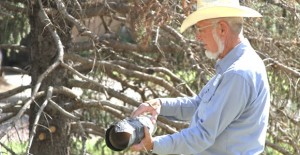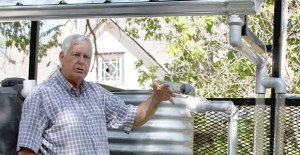

The Clarendon Enterprise - Spreading the word since 1878.

Services were held last week for former local newspaper publisher Ruby Dell Estlack, who passed away at home in Clarendon at the age of 94.
Mrs. Estlack died Friday, July 20, and services were held at the First United Methodist Church in Clarendon with Rev. Lloyd Stice, pastor, officiating and interment followed in Citizens Cemetery. Arrangements were by Robertson Funeral Directors.

Mrs. Estlack was born October 18, 1917, in Donley County to Oma Allen and Faye Tyree Scoggins. She married George Wayne Estlack on November 28, 1936, in Clarendon, where she spent most of her life. Ruby Dell loved playing the piano, at which she played by ear. She was a wonderful seamstress as well.
Ruby Dell spent most of her adult life working at The Donley County Leader. She began working at the Leader shortly after she married 1936, and she was assigned the job of collecting on accounts, which she did in person in order to improve goodwill between the paper and its customers. She later would take on the role of Society Editor as well before she and her husband became the paper’s sole owners in 1958. Together they were members holding various offices of both Texas and Panhandle Press Associations. The Estlacks sold the paper in 1974 but continued in the printing business with Clarendon Office Supply until the mid-1990s.
In 2011, she was inducted in the Panhandle Press Association’s Hall of Fame, an award she was very honored to receive.
“At the age of 19 when I married and became a member of the Estlack newspaper family, I never dreamed of seeing this day,” Ruby Dell recalled after entering the PPA Hall of Fame. “I found myself working in all departments of The Donley County Leader – except Linotype. The many years of newspaper publishing have been my way of life and most rewarding. I’ve been so blessed.”
Ruby Dell was a long time member of the First United Methodist Church in Clarendon.
She was preceded in death by her husband, George Wayne Estlack, on June 10, 1994, and her sister, Dorothy Faye Whitlock.
Survivors include her daughter, Jackie Patterson of Canyon; granddaughter, Marcella Cropper of Fort Worth; her great grandson, James David Wilson of Fort Worth; her nephew, Lawrence Whitlock, of Arizona.
The family suggests memorials be sent to Citizens Cemetery Association, PO Box 983, Clarendon, Texas, 79226.
Marvin Davis Gill of Clarendon, 74, died Friday, July 27, 2012, in Amarillo.
Marvin was born on June 30, 1938, in Grapeland, Texas to Elmer Roy and Ailene Gill. Marvin was a hard working man and spent his early years in the insurance business. While pursuing his love for helping people and building business, he continued to seek the fulfillment of other aspects in life, such as starting a family.

Marvin met his loving wife, Suzy, on a blind date. After exchanging many heartfelt love letters during their courtship, they married August 30, 1957. Marvin and Suzy shared a wonderful life together filled with love and soon, children.
Marvin enjoyed hunting, fishing, snow skiing, and travel. He loved visiting with his many friends he had made from all over the country.
He was a true salesman with his contagious smile and bubbly laugh. He loved to tell stories of his many travels, both national and international, with his friends and make everyone laugh. He was a very generous man and a wonderful grand-father, or “Boppy,” to many grandchildren and took the pleasure of teaching them his beloved game of golf.
As a well respected rancher and business owner, Marvin became dear to the many friends he made in the Clarendon community and panhandle area.
As one of Jehovah’s Witnesses, Marvin was a man of deep faith and was devoted to sharing the Bible truth with others. He dedicated his life to Jehovah God on March 19, 1962. It was paramount in his life.
Marvin passed away, with his family by his side, as a faithful servant of Jehovah on July 27, 2012. Marvin’s enthusiasm for not only his faith, but for life itself was inspiring.
Marvin is survived by his wife, Carolyn Sue Gill, one son Jeffrey Herbert Gill and wife Roberta, and two daughters; Jean Ann Hinson and husband Toby and Jennifer Gill Haney and husband Brad. As well as eight grandchildren: Allen Womack and wife Rebecca, Kristen Gill Grandi and husband Shawn, Eli Hinson, Caleb Hinson and wife Angel, Yancey Gill and wife Jessie, Savannah Thackeray, Casey Haney, and Ben Haney. He is also survived by six great granddaughters: Morgan, Katelynn, Finley, Henley, Liv, Clair, and great grandson Austin.
In addition, he is survived by his 2 sisters and brother along with their spouses, Martha Loy and Jimmy Basye, Iva Lou and Donald Gene Crawford, and William and Val Grant. He is also survived by many genuinely loving nieces and nephews.
Marvin was preceded in death by his mother Ailene Grant, his step-father Clint Grant, his father Roy Gill, and his sister Sarah Evelyn Edwards.
The family wants to thank all of the close friends and family that have been by their side throughout this entire journey.
Memorial services were held at Robertson Funeral Directors Saints’ Roost Chapel in Clarendon on Tuesday, July 31, 2012; at 11:00 a.m. Cremation and Arrangements are by Robertson Funeral Directors of Clarendon.
In lieu of flowers, donations may be made to the World Wide Work of Jehovah’s Witnesses in c/o Kingdom Hall of Jehovah’s Witnesses; Highway 287 N, Clarendon, TX 79226.
Capturing rainwater is one way people can learn to live through drought conditions and meet the need for water, according to speakers at a conference here Saturday.
About 35 people from Donley County, as well as Amarillo and Canyon, attended the seminar that started at the historic Lowe House owned by Sara SoRelle, where volunteers helped install a 1,000-gallon rain collection system.

Billy Kniffen, a water resources specialist from Texas A&M University, led the session and also oversaw the installation of the system that will collect water from 500-square-feet of roof on a garage apartment and divert it for landscape uses.
“We’ve got to learn to get more water or use less water,” Kniffen told those in attendance. “If you want to make a difference, you can. But you have to decide for yourself to do this.”
Kniffen said rainwater collection is catching on in the United States, and some municipalities – San Antonio and Santa Fe – are collection systems be included in certain new constructions. In Texas, all new state buildings are supposed to have rainwater collection systems, he said.
The cost of a system can range from 50 cents per gallon capacity up to $2.25 per gallon depending on the size and intended use of the system.
“We need to start small and grow,” Kniffen said, noting that it’s easy to start with 20-gallon barrel to collect water for pets and plants. “We need to ask what communities can do to encourage rainwater harvesting.”

Kniffen said a simple formula can determine how much rainwater a roof is capable of collecting. About 0.6 gallons of water falls on each square foot of roof area in a one-inch rain. A 1,000-square-foot roof could yield 600 gallons of water for each inch of rainfall.
Kniffen’s home in Menard, Texas, operates totally on rainwater for all uses. He has 25,000 gallons of storage capacity. During last year, from October to October, they received only five inches of rain, but at the end of that period he still had two months of water available.
“We operate on 20 gallons of water per person per day,” he said of his home, which includes several water conservation features, including low-flow toilets, faucet aerators, and landscaping that requires very little water.
Kniffen said metal roofs are the best for collecting rainwater but tile and composition roofs work also. Shake shingles are more problematic. Screens and diversions can keep water collected in roof gutters from washing debris into the storage tanks, and Kniffen recommends black or other tanks that cannot be penetrated by light to prevent algae growth. Tanks can also be painted, decorated, or otherwise modified to blend in better with the landscape of a home or business.
“I want it to look neat,” he said.
Rainwater can be filtered and treated to be consumable by humans, but many people use collected rainwater for non-potable uses in the home, such as for commodes and washing machines, Kniffen said.
“Ten percent of Australians live solely on rainwater, and New Zealand requires all new homes use rainwater for commodes, washers, and landscape irrigation,” Kniffen said.
Local municipalities can set the allowable uses of rainwater in homes.
Alanreed rancher Delbert Trew also spoke at the session and said he has been practicing rainwater harvesting on his land for 18 years. He has not done any rooftop collection, but he has built about 300 catchments – small dams that divert water into the ground – around the tops of gullies and canyons on his property.
Trew said he started his harvesting after he had two wells go dry in his pasture. His efforts paid off over time with about 11 springs now flowing on his ranch where there was only a handful before, and, until last summer, he was able to shut off his windmill wells completely.
Trew also demonstrated how to build and install “tree pipes” to deep water trees and hopefully save them from the effects of the drought. He showed how a four-foot length of four-inch pipe could be cut or drilled and wrapped with landscape fabric and then buried vertically near a tree’s drip line. Tree pipes could be any size and made of almost any material – even cardboard tubes. He said one town had gathered up all the scrap PVC pipe they could find, had the high school ag department cut it into lengths and drill holes in it, and then the city gave the tree pipes away.
Deep tree irrigation gets the water down to the tree’s roots and doesn’t promote the growth of weeds and grass like surface watering does, and the water doesn’t evaporate, Trew said. A slow running hose can then be inserted in the pipe or it can be fed by a rainwater collection system.
SoRelle also demonstrated a young tree that she was using “rock mulching” on – a technique of having a shallow reservoir around a tree filled with large stones to hold water around the tree.
Speakers Saturday all admitted that it has to rain for rainwater collection systems to work, but they pointed out the vast amounts of water that is usually allowed to just runoff of properties and down city streets as wasteful in a time when water has become so precious.
For more information, visit http;//rainwaterharvesting.tamu.edu.
The City of Clarendon agreed to throw a financial lifeline to the Chamber of Commerce last Tuesday to keep the organization afloat as it continues to restructure.
City Administrator Lambert Little told the Board of Aldermen that the Chamber is incurring expenses of about $300 a month to maintain its office. He said the city and the Clarendon Economic Development Corporation anticipates having a new director of tourism and economic development on board by August 15 and that office along with Chamber functions will be housed in the Mulkey Theatre barber shop. But he said that move will likely be about three months away and the Chamber needs help now.
“It’s going to be easier to keep the Chamber hanging on than it would be to start it again,” Little told the board.
Alderman Tommy Hill agreed and spoke on the Chamber’s behalf.
“I believe in the Chamber; it can do a lot of good,” Hill said. “We’ve got to give them a chance.”
The aldermen unanimously agreed to give the Chamber $1,000 to help it through the next three months.
Last year, Clarendon aldermen withdrew $20,000 in annual payments from the city’s hotel occupancy tax to the Chamber of Commerce over disagreements about how the organization kept records of city money.
Clarendon and Howardwick subscribers of the Amarillo Globe-News may have experienced delayed or no delivery of newspapers in recent weeks, and according to District Circulation Manager Heather Reed a turnover in carriers in addition to a loss of up to date subscriber data during carrier transition has led to these problems.
The Globe-News subscriber list currently being used by carriers in Donley County is out of date and unless subscribers call in, the carrier has no way to know who is not receiving a paper. Many subscribers’ papers are being delivered to old addresses or just aren’t being delivered as a result of the out of date information.
“We are trying to piece things together,” Reed said.
Reed asks that subscribers experiencing circulation problems call Customer Service Representatives Kim or Donna at 806-345-3407 between 5 am and 11 am daily rather than call the automated system. According to Reed, these representatives are located in the Amarillo office and can verify subscriber accounts and correct any issues with addresses.
Another problem facing Globe-News readers in Donley County is the issue of there being no permanent carrier here currently.
“Right now I am sending a manager down to deliver,” Reed said, “but it’s just costing too much.”
If a local carrier isn’t found soon, Reed said home delivery here will be stopped altogether.
Local carriers receive papers around 2 a.m. and have until 6 a.m. to deliver to the roughly 200 daily and 240 Sunday subscribers in Clarendon and Howardwick.
Anyone interested in the position can call Reed at 806-345-3253.
Staff members from Odyssey Hospice will be blanketing Clarendon and the surrounding areas throughout August, distributing food collection bags and gathering donations for Snack Pack for Kids as part of the company’s 8th Annual Food Drive.
As part of the Gentiva Health Services family of home health and hospice providers, employees at Odyssey Hospice and their fellow employees around the country are placing the food collection bags at various healthcare facilities, local businesses and churches in their respective communities and will collect their “harvest” during the entire month of August. They are focused on beating last year’s national record, when the company’s 7th Annual Food Drive yielded more than 382,702 pounds of goods for donation to charitable organizations across the country.
“As active members of the community, we know that food banks, pantries and other charitable organizations continue to face increasing demands due to our troubling economy,” said Brande Bigham, Community Liaison, Odyssey Hospice. “We look forward to working with many area health organizations, and we encourage local healthcare providers to contact us for more information on how they and their employees can participate in this community effort.” Odyssey Hospice provides a full range of hospice services to patients in the Texas Panhandle.
Area residents, physicians and referral sources who want to learn more about Odyssey’s superior hospice services should contact Brande Bigham at 806-626-8353. The Odyssey office is located at 6900 I-40 West #150.
Bill George Bird of Clarendon, formerly of Oxnard, California, 85, died Thursday, July 26, 2012, in Amarillo.
Private Family Burial at Citizens Cemetery in Clarendon.
Services were under the direction of Robertson Funeral Directors of Clarendon.
Bill was born October 3, 1926 in Haskell, Texas to George and Una Lee Edwards Bird. He married Lorraine Nagy on September 10,1953 in Las Vegas, Nevada. He had worked in the upulstery business most of his life and had owned his own business during that time. We was a WWII veteran, serving in the US Navy. Mr. Bird had moved to Clarendon recently after living in Oxnard, California for the past 70+ years. He was a Baptist.
He was preceded in death by his wife, Lorraine Bird in October of 2011; his parents; a son, Bill Greg Bird; 2 brothers, Robert and Jerry Bird; and his sister, Carol Bush.
He is survived by 4 daughters, Debbie Roberts of Clarendon, Jeanette Williams and husband Rick, Jeneil Beltran, Melissa Bird, all of California; a son, Larry Bird and wife Karla of California; 8 grandchildren; and 8 great grandchildren.
PAMPA – A Wheat Planning Conference will be offered from 10 a.m. to 3 p.m. August 8 at the Gray County Annex, 12125 E. Frederic Ave. in Pampa.
The event is being planned by the Texas AgriLife Extension Service offices in Gray, Carson, Roberts and Armstrong counties, said Brandon McGinty, AgriLife Extension agriculture and natural resources agent in Gray County.
“Producers face new challenges this year with little soil moisture,” McGinty said. “This is an opportunity for producers to look at new wheat varieties and management decisions to help make better decisions for this upcoming wheat crop.”
Private pesticide applicators will be offered three Texas Department of Agriculture continuing education units – one integrated pest management and two general, he said.
Topics and presenters will be: Wheat Composting, Doak Elledge, Gray County producer; Wheat Disease Updates, Dr. Ron French, AgriLife Extension plant pathologist, Amarillo; Wheat Fertility Issues-Irrigated, Rick Kochenower, Oklahoma State University Extension agronomist, Goodwell, Okla.; Market Updates and Insurance Issues, DeDe Jones, AgriLife Extension, Amarillo; Wheat Variety Trials Results, McGinty; and Wheat Insect Issues, Dr. Ed Bynum, AgriLife Extension entomologist, Amarillo.
There will be a $10 fee for this conference, to be paid at the door, and a noon meal will be provided, McGinty said. Individuals should RSVP by August 6 to their local AgriLife Extension office in Carson, Gray, Roberts or Armstrong counties, or call 806-669-8033.
PAMPA – Ranchers and other landowners can attend a “Brush and Weed Management” program August 17 at the Gray County Annex, 12125 E. Frederic Ave. in Pampa.
The event is planned by the Texas AgriLife Extension Service office in Gray County, said Brandon McGinty, AgriLife Extension agriculture and natural resources agent in Gray County.
“With the continuing drought, weed and brush control are a must, but rainfall is needed to maintain decent controls,” McGinty said. “This program will assist producers with their brush and weed management decisions.”
The program is scheduled to begin at 10 a.m. and end at 2 p.m. Those attending will be offered two Texas Department of Agriculture private pesticide applicator continuing education units – one general and one drift, he said.
On the program will be Jodie Stockett, Dow AgroSciences, Claude, discussing herbicides, and Will Hatler, AgriLife Extension ecosystem science and management program specialist in Stephenville, talking about setting up and use of equipment; treatment: hot, dry, moisture and timing; and determining needs – evaluation of a range site.
A $10 fee will be charged at the door for this program. Those planning to attend should RSVP by Aug. 14 to the AgriLife Extension office in Gray County at 806-669-8033.

Reader Comments